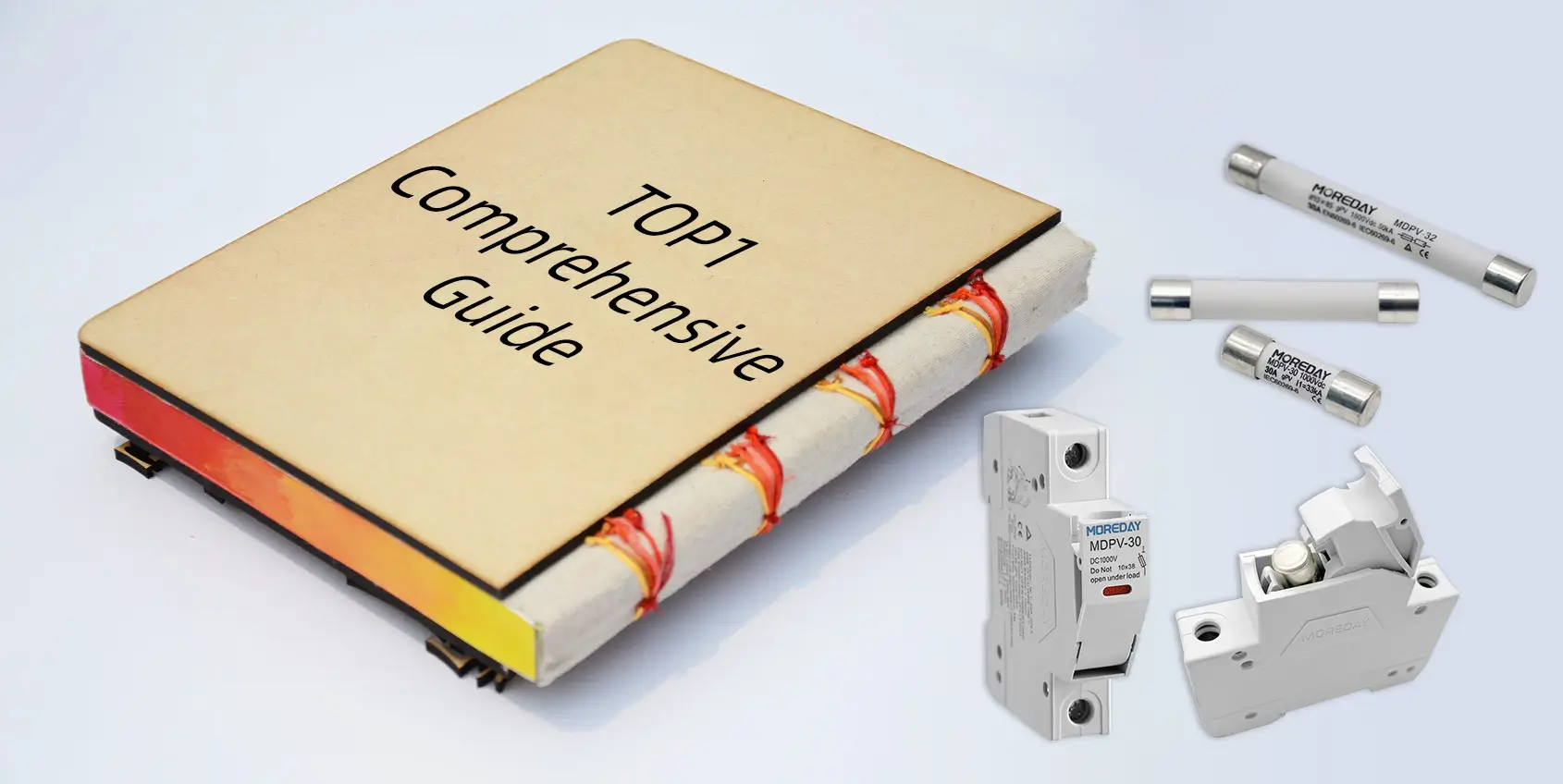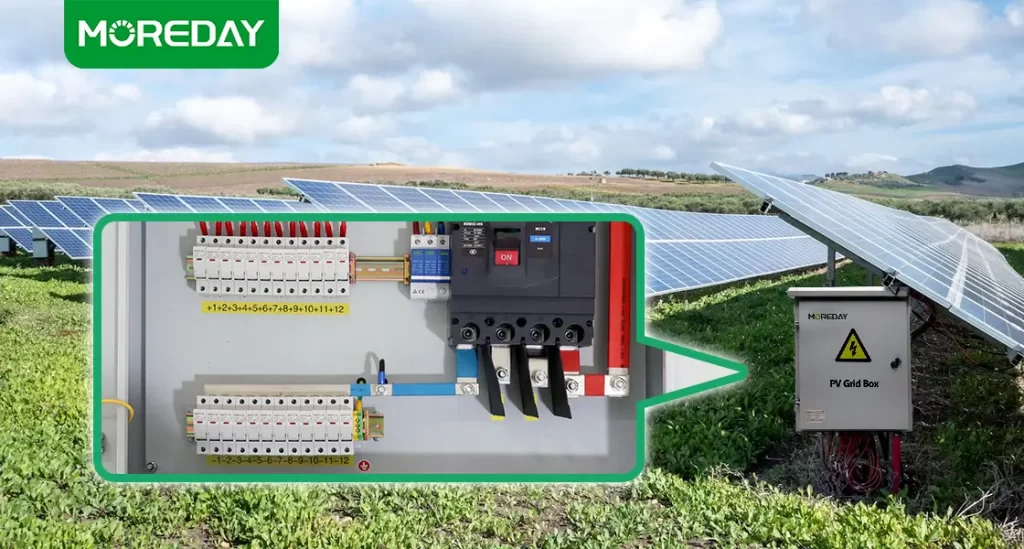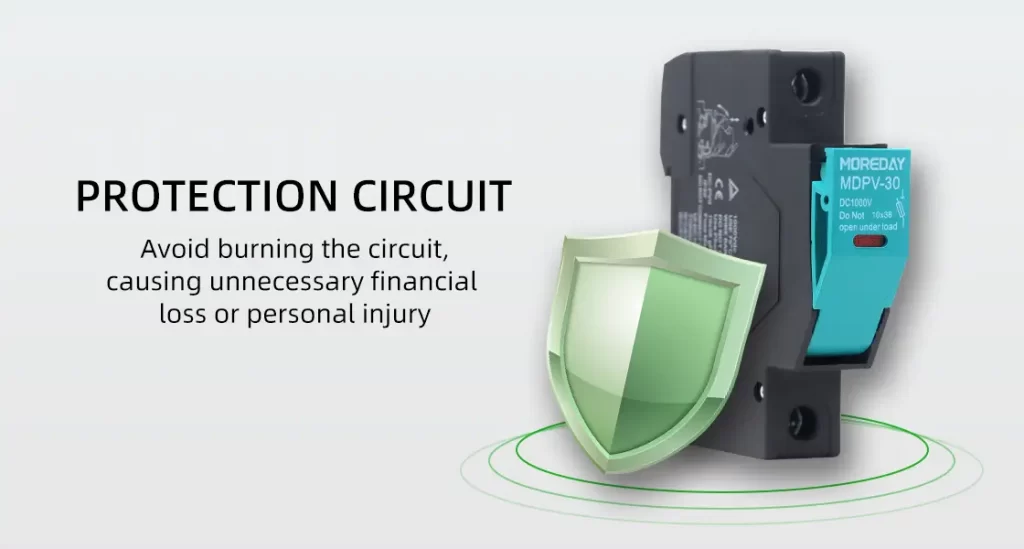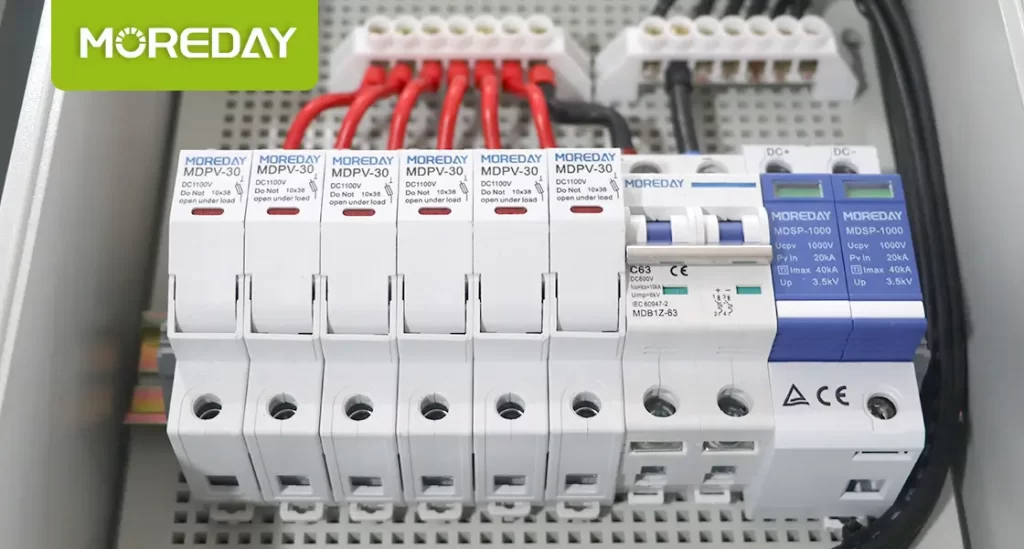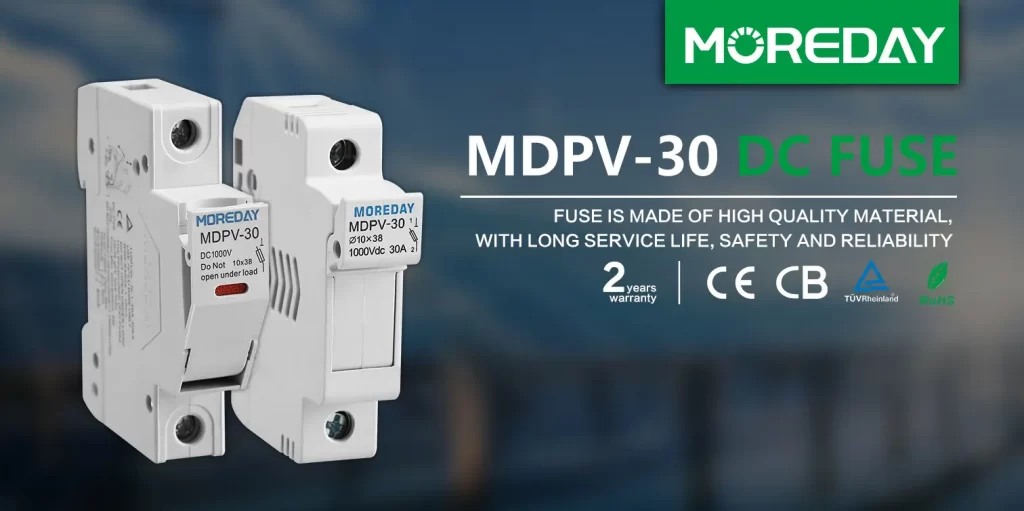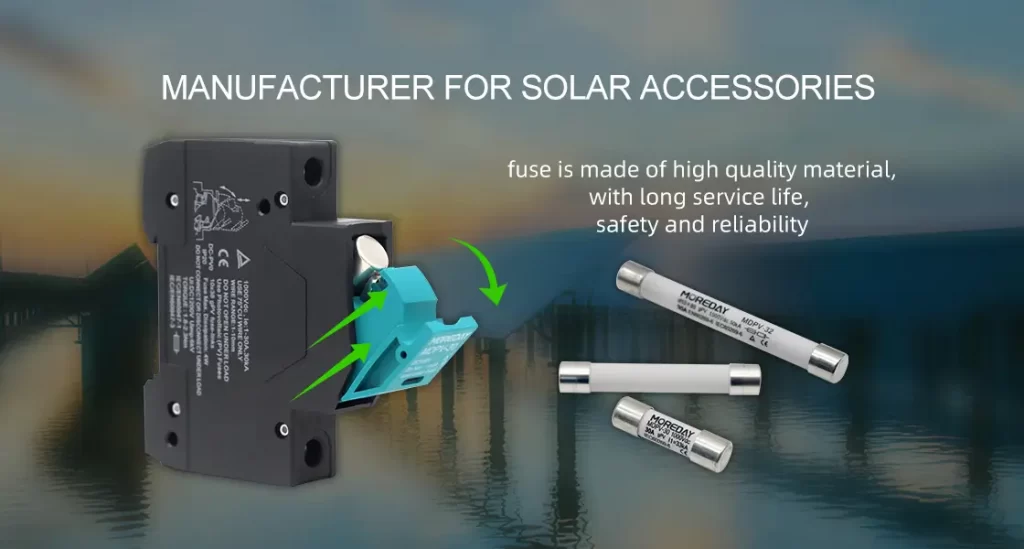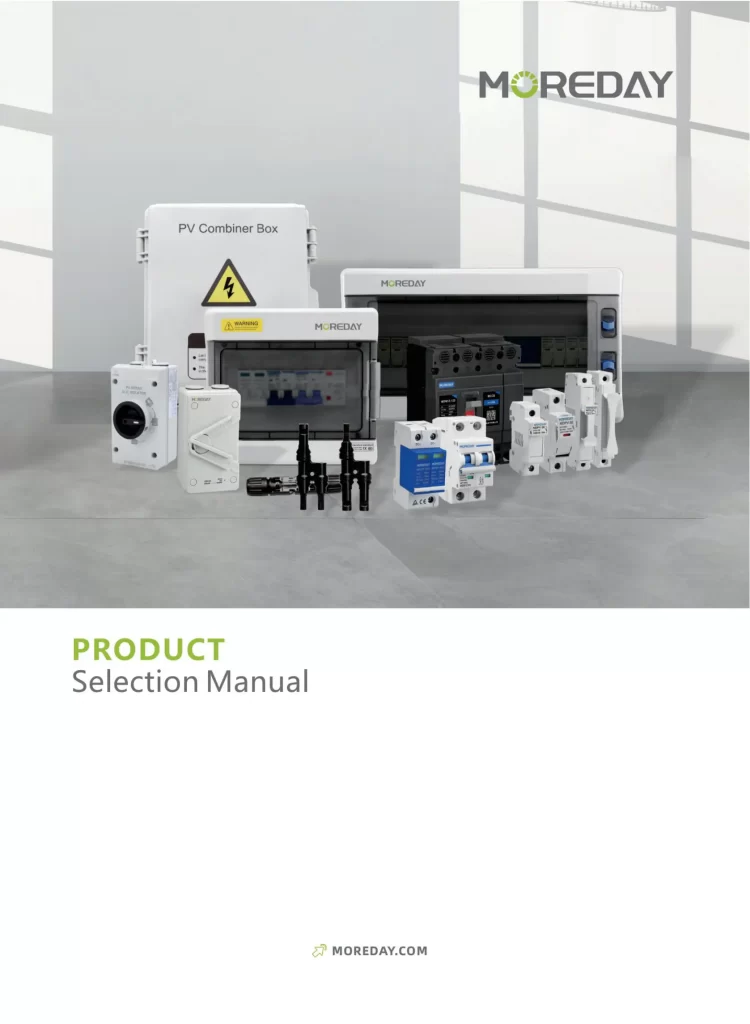Introduction
Embark on a journey through the intricate realm of DC fuses with our all-encompassing guide! Within these pages, we’ll unravel the significance of DC fuses across diverse applications, with a special focus on their role in solar power systems.
In the realm of electrical circuits, the choice of fuse is paramount, safeguarding both individuals and equipment. In solar systems boasting multiple strings of photovoltaic (PV) modules, DC fuse links find their home in combiner or array junction boxes, shielding the strings. However, deciphering the right fuse for a PV DC system can prove to be a formidable undertaking.
To fathom the reasoning behind fuse selection for a PV DC system, one must first grasp the fundamental disparities between AC and DC currents. AC current, with its constant ebb and flow of electron movement, presents a relatively straightforward task for a fuse to halt. In contrast, DC current flows steadfastly in a single direction, presenting a greater challenge for a fuse to interrupt. DC fuses are meticulously crafted, housing additional components to extinguish the ensuing arc.
When it comes to fuse ratings, no rigid mathematical correlation exists between AC and DC ratings. A fuse rated for a specific voltage in AC applications may carry a disparate rating in DC settings. As a general guideline, AC fuses necessitate a 50 percent derating to guarantee safety in DC scenarios. However, it is prudent to consult the fuse manufacturer for precise test outcomes and specifications.
In PV systems, DC rated fuses are engineered to swiftly break at the rated current, ensuring maximum safeguarding for cabling, junction boxes, and PV modules. Employing an erroneously rated fuse in a PV installation can lead to dire consequences, potentially causing equipment damage and even endangering lives. Hence, it is imperative to consistently opt for the appropriate DC-rated product for PV installations.
Within the expanse of this guide, we shall delve into an array of factors pivotal in the selection of a DC fuse. We’ll spotlight the significance of precise fuse sizing in PV systems, elucidate the prevalent applications of DC fuses in solar power ventures, and expound upon the gravity of fuse ratings in DC settings. Moreover, we’ll dissect the hurdles tied to interrupting DC current and how fuses rise to meet this challenge.
So, whether you stand as a seasoned professional in the solar power domain or a curious mind eager to grasp the intricacies of DC fuses, this expansive guide promises to furnish you with invaluable insights and wisdom. Let’s plunge headfirst into the enthralling universe of DC fuses!
Understanding the Difference between AC and DC Fuse
When it comes to fuses, a fundamental distinction arises between AC (alternating current) and DC (direct current) systems. AC fuses are engineered to disrupt the circuit when the current undergoes reversal, whereas DC fuses face a more daunting task due to the unceasing flow of current in a singular direction.
Within AC systems, the current experiences a zero magnitude point every 100 times per second in 50Hz circuits. This juncture of zero simplifies the task for AC fuses to interject and extinguish the arc. Once the current hits zero, the energy sustaining the arc across the molten fuse element dissipates, effectively halting the current flow.
Conversely, DC systems maintain a constant current flow in a single direction, devoid of a zero point to aid the fuse in extinguishing the arc. This renders it more challenging for DC fuses to sever the circuit. To surmount this hurdle, DC fuses are constructed differently from their AC counterparts and incorporate supplementary components to extinguish the arc.
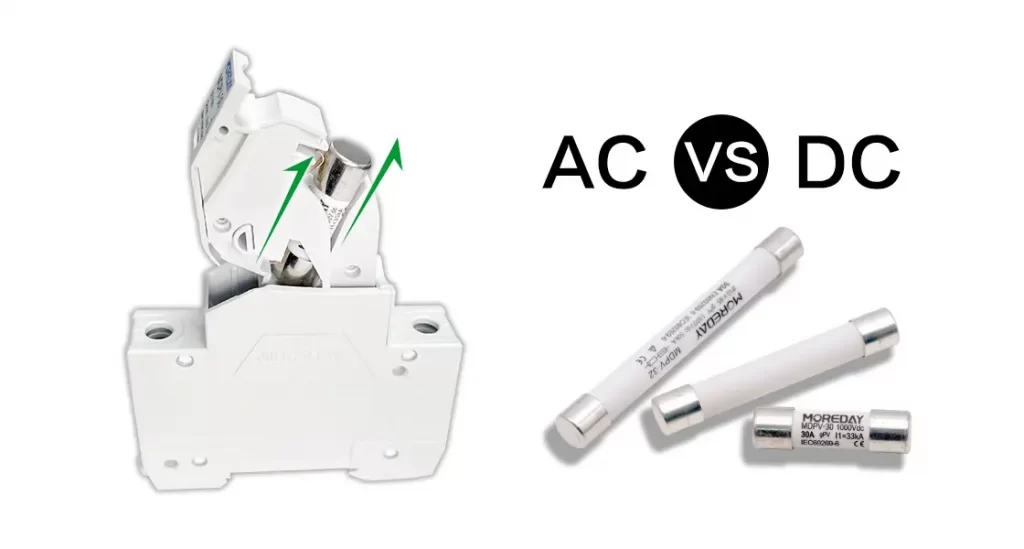
It’s vital to bear in mind that AC and DC fuses possess distinct standard rated voltages, with no strict mathematical correlation between the two. For instance, a fuse rated at 1000V AC may have a differing rating for DC, like 500V DC or 750V DC, contingent on its construction. As a general guideline, a standard AC fuse necessitates a 50% derating to ensure safety in DC applications. Nevertheless, it is always prudent to consult the fuse manufacturer for precise test results and specifications prior to forming any assumptions.
In PV (photovoltaic) systems, where multiple strings of PV modules are linked, DC fuses are deployed to safeguard the strings. These fuses are engineered to rupture at the designated current in a concise span, affording maximal protection for the system components. It is imperative to employ the accurate DC-rated fuses in PV installations to guarantee the well-being of individuals and equipment. The use of an improperly rated fuse can culminate in calamitous outcomes, encompassing harm to the system and, potentially, loss of life.
When procuring fuses via online platforms, it is imperative to verify that you are selecting the precise type for your specific application. Websites such as Digikey, Mouser, Arrow, and Avnet are renowned distributors for electronic components, offering an extensive array of DC fuses. However, it is vital to meticulously scrutinize the product specifications and seek guidance from the manufacturer if any doubts linger regarding the fuse’s AC or DC rating.
In summary, comprehension of the disparity between AC and DC fuses proves indispensable in the selection of the apt fuse for a given application. DC fuses grapple with distinct challenges in disrupting the circuit, courtesy of the ceaseless flow of current in a singular direction. Therefore, it is paramount to incorporate DC-rated fuses in PV systems and to engage with the manufacturer for precise information when procuring fuses online. Through the judicious selection of the appropriate fuse, you can safeguard the integrity and security of your electrical system.
Factors to Consider When Choosing a SOLAR Fuse
Choosing the right DC fuse for your application is crucial to ensure the safety and efficiency of your electrical system. With the unique challenges that come with direct current, it is important to consider several factors when selecting a DC fuse. Here are some key factors to keep in mind:
1. Voltage Rating
Considering the voltage rating of a DC fuse is paramount. Unlike their AC counterparts, which benefit from a zero point aiding in current interruption, DC fuses necessitate extra components to quell the arc. Thus, it is imperative to opt for a fuse with the fitting voltage rating that aligns with the specific demands of your DC system. Always seek guidance from the fuse manufacturer or delve into product specifications to ascertain the precise voltage rating for your application.
2. Current Rating
The current rating of a DC fuse is another pivotal aspect to take into account. It is crucial to opt for a fuse with a current rating that aligns with the highest current your system is likely to encounter. Opting for a fuse with a lower current rating could result in frequent fuse blowouts, while selecting one with a higher rating might jeopardize the safety of your system. Thoroughly evaluate the maximum current requisites of your DC system to guarantee the correct selection of a fuse.
3. Time-Current Characteristics
The time-current characteristics of a DC fuse pertain to its reaction to overcurrent situations across time. Selecting a fuse with the fitting time-current attributes is vital to guaranteeing efficient safeguarding for your electrical system. Deliberate on elements like the duration and intensity of potential overcurrent incidents in your system, and opt for a fuse capable of responding appropriately.
4. Environmental Conditions
DC fuses utilized in PV installations are subject to severe environmental elements, including sunlight exposure and temperature fluctuations. These factors can have an impact on the fuse’s performance over time. Hence, it is imperative to select a fuse explicitly engineered to endure these demanding conditions and uphold its operational integrity. Seek out fuses that are purpose-built for PV applications and have undergone rigorous testing and approval by reputable electrical certification authorities.
5. Fuse Holder Compatibility
Ensuring compatibility between the chosen DC fuse and its holder is paramount. The fuse holder itself must also bear a rating tailored for DC applications, guaranteeing both proper functionality and safety. Thoroughly examine the fuse holder for its DC designation and confirm that it aligns with your system’s requisites.
By taking these aspects into account, you can make a well-informed choice when selecting a DC fuse for your particular application. Remember, the precise fuse choice holds great importance for safeguarding your electrical system and ensuring the safety of individuals and equipment. It is always wise to consult with the fuse manufacturer or seek professional guidance to ascertain the correct fuse selection for your specific DC system.
The Importance of Proper PV Fuse Sizing in PV Systems
In the realm of solar power systems, the proper sizing of fuses takes center stage. Fuses play a pivotal role in safeguarding the system against short circuits and potential fire hazards. They are engineered to self-sacrifice in order to protect the electrical components, thus preventing any potential damage or accidents.
One of the pivotal reasons why accurate fuse sizing is paramount in PV systems is to ensure the safeguarding of cabling, junction boxes, and PV modules. Fuses bear the responsibility of interrupting the current flow when it surpasses the rated value, thereby averting potential harm to the system. Selecting the correct fuse size is imperative to guarantee that the fuse can handle the maximum current the system may encounter without compromising its ability to break the circuit.
In addition to fortifying the system, precise fuse sizing is also crucial for the safety of individuals working with or in proximity to the PV system. Utilizing an improperly sized fuse can result in overheating and potentially lead to fires or electrical shocks. Hence, it is vital to opt for fuses explicitly designed for PV applications, capable of handling the maximum current the system may generate.

Yet another aspect to factor in when sizing fuses in PV systems is the constant current generated by PV modules. PV modules produce an unbroken stream of current, and using fuses that are inadequately sized for this continuous current can result in premature fuse failure or even harm to the system.
To guarantee the accurate sizing of fuses in PV systems, consulting the manufacturer’s specifications and guidelines is essential. The manufacturer will furnish details on the rated current and voltage for their fuses, along with any derating factors that need to be taken into account for DC applications. It is crucial to acknowledge that fuses rated for AC applications may not be suitable for DC applications due to disparities in current flow and arc extinguishing capabilities.
In summation, precise fuse sizing is pivotal for the secure and efficient operation of PV systems. It ensures the safeguarding of the system components, prevents potential damage or accidents, and fosters the overall dependability and longevity of the system. Through the selection of fuses expressly designed for PV applications and mindful consideration of the continuous current generated by PV modules, installers can guarantee the optimal performance and safety of the PV system.
Common Applications of DC Fuses in Solar Power Projects
In the realm of solar energy endeavors, DC fuses assume a pivotal role in guaranteeing the safety and operational efficiency of the system. These fuses find their application in diverse nooks of the solar PV system, encompassing string combiner boxes, array boxes, and the DC facet of the inverter system.
The paramount rationale behind the incorporation of DC fuses in solar energy undertakings lies in fortifying the system against short-circuits and potential fire hazards. These fuses serve as over-current sentinels, willingly sacrificing themselves to shield the electrical infrastructure. Engineered to interrupt circuits when an excess of current courses due to overloads or faults, they thwart potential conflagrations and mitigate ensuing damages.
In the expanse of a large-scale solar system, interlinking myriad strings in parallel, it becomes imperative to assure insulation against reverse current and over-current contingencies. DC fuses are expressly crafted to disengage at their stipulated current threshold in minimal time, thus affording paramount safeguarding for cabling, junction boxes, and PV modules. The judicious choice of fuse size is of essence to accommodate the unceasing current generated by PV modules and to endure the harsh environmental rigors that solar installations confront.
The selection and calibration of fuses emerge as indispensable facets of solar energy undertakings. Fuses of judicious proportions vouchsafe the optimal operation of the system while averting potential harm or safety hazards. Furthermore, it behooves one to scrutinize fuse holders for their DC rating to confirm harmonious integration with the DC application.
When one embarks on the procurement of DC fuses for their solar energy venture, the selection of a dependable and esteemed supplier is of the essence. Portals such as Digikey, Mouser, Arrow, and Avnet are eminent purveyors of electronic components, presenting a diverse array of options for DC fuses. These platforms furnish meticulous product particulars, encompassing voltage and current ratings, to empower you in making an enlightened choice.
In summation, DC fuses constitute irreplaceable constituents of solar energy initiatives, furnishing a bulwark against short-circuits and fire perils. The sagacious selection, calibration, and alignment with the DC application stand as linchpins in assuring the safety and operational efficiency of the system. By opting for a reputable supplier and taking into account the specific requisites of your project, you can procure the precise DC fuses tailored to your exigencies.
Fuse Ratings and Their Significance in DC Applications
When delving into the realm of DC fuses, a firm grasp of their ratings becomes paramount. It’s these ratings that dictate the upper limits of current and voltage a fuse can withstand before giving way. In the domain of DC, the voltage rating takes on added significance as extinguishing DC arcs proves more challenging than their AC counterparts.
DC fuses are engineered to disrupt the circuit when current surpasses their designated threshold, serving as a bulwark against over-current and short-circuit scenarios. The designated current of a fuse denotes the maximum load it can safely bear without yielding. Thus, selecting a fuse with a designated current aligned with your PV system’s operational current is of utmost importance.
In tandem with the designated current, the voltage rating carries equal weight. DC fuses boast voltage ratings distinct from their AC counterparts, owing to the intricacies of interrupting DC arcs. The voltage rating of a fuse determines its efficacy in quelling the arc that emerges upon blowing. Hence, opting for a fuse with a voltage rating mirroring your PV system’s maximum voltage is imperative.
It’s worth noting that there exists no rigid mathematical correlation between AC and DC fuse ratings. A fuse assigned a certain voltage rating in AC applications may sport a lower rating in DC settings. A general guideline suggests derating AC fuses by 50% in DC applications. Nevertheless, it’s always prudent to seek counsel from the fuse manufacturer for precise data and test outcomes.
When procuring DC fuses, it’s imperative to verify that the product is purpose-built and endorsed for DC use. Not all fuses are compatible with DC setups, and employing an ill-suited fuse can lead to calamitous outcomes. Always scrutinize the product specifications and seek guidance from the manufacturer or an internationally-recognized electrical certification body for validation.
Adequate fuse sizing is pivotal for the seamless and secure functioning of your PV system. Fuses that are undersized may blow with undue frequency, incurring needless downtime and maintenance expenses. Conversely, fuses that are oversized may fail to furnish sufficient safeguarding against over-current situations, imperiling both equipment and personnel.
To ascertain proper fuse sizing, factor in considerations such as the maximum current and voltage of your PV system, the nature of connected loads, and the ambient temperature. Refer to industry norms and recommendations from fuse manufacturers, in addition to consulting guidelines, to determine the fitting fuse size for your specific application.
In summation, precise fuse sizing is pivotal for the secure and efficient operation of PV systems. It ensures the safeguarding of the system components, prevents potential damage or accidents, and fosters the overall dependability and longevity of the system. Through the selection of fuses expressly designed for PV applications and mindful consideration of the continuous current generated by PV modules, installers can guarantee the optimal performance and safety of the PV system.
The Challenges of Interrupting DC Current and How Fuses Address Them
When it comes to interrupting the flow of current, DC circuits present unique challenges compared to AC circuits. Unlike AC circuits, where the current changes direction and reaches zero at regular intervals, DC circuits maintain a constant flow of current in one direction. This continuous current makes it challenging for fuses to break the circuit and provide protection against overloads or faults.
In AC circuits, the zero point of the current cycle aids in extinguishing the arc that forms when a fuse blows. However, in DC circuits, there is no such zero point to assist in extinguishing the arc. Consequently, DC fuses require a different construction and additional components to effectively interrupt the current flow and extinguish the arc.
DC fuses are purpose-built for PV applications, designed to break at the rated current in a short amount of time. This ensures maximum protection for cabling, junction boxes, and PV modules. It is imperative to use DC-rated fuses in PV installations to prevent equipment damage and ensure individual safety.
When selecting a DC fuse, considering the voltage rating is crucial. DC fuses have distinct voltage ratings from AC fuses, and there is no strict mathematical relationship between the two. As a general guideline, an AC fuse rated at 1000V would need to be derated to 500V for DC applications. However, consulting the fuse manufacturer for specific test results and specifications is always recommended.
MOREDAY BRAND
Alongside voltage rating, proper fuse sizing is essential in PV systems. Fuses serve to protect against short circuits and fire hazards, and they must be capable of handling the continuous current produced by PV modules. Correctly sizing the fuse ensures it can effectively interrupt the current flow and safeguard the system.
Fuses play a pivotal role in solar power projects, offering vital protection for PV installations. Whether they are employed in string combiner boxes, array boxes, or the DC side of the inverter system, fuses guard against potential damage caused by overloads or faults. They are exposed to harsh environmental conditions, including sunlight exposure, which can impact their performance. Therefore, selecting the appropriate fuses and cables for PV installations and ensuring their proper sizing is of utmost importance.
In conclusion, interrupting DC current poses distinct challenges for fuses in comparison to AC circuits. DC fuses are expressly crafted to tackle these challenges and provide utmost protection for PV systems. Thoughtful fuse selection and sizing are pivotal in guaranteeing the safety and effectiveness of PV installations. By comprehending the intricacies of interrupting DC current and employing the right fuses, individuals can safeguard themselves, their equipment, and their clientele from potential risks and harm.
Derek Ke
Hey, I’m Derek Ke, the founder of Moredaydc.com, an expert in solar electrical products and ev charging.
In the past 15 years, we have helped 60 countries and nearly 500 customers (such as farms, residences, industrial and commercial) solve new energy and green power problems. This article aims to share more knowledge about solar electricity and new energy with everyone, so that green electricity can enter every home.
Make Electricity Available To All People

